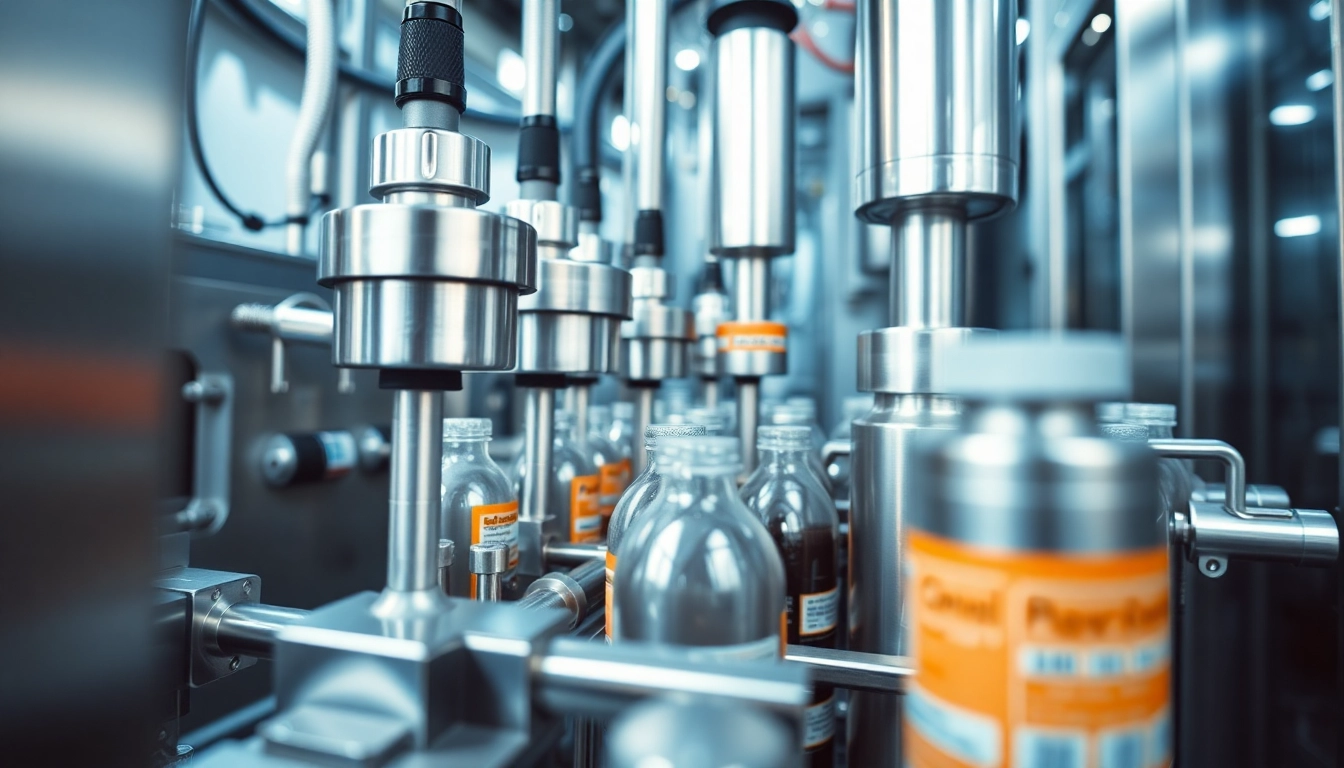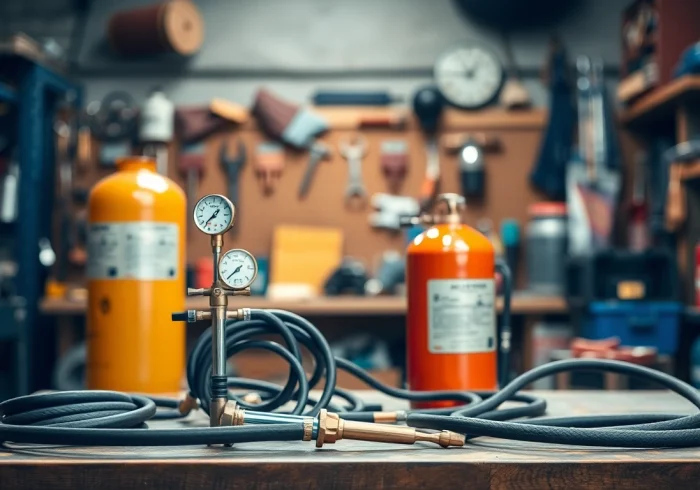Understanding Filling Machines
Filling machines play a critical role in various manufacturing processes. These machines are essential for industries looking to streamline their packaging operations, ensuring products are efficiently and accurately filled before reaching consumers. Understanding what filling machines are, their types, and their applications is crucial for businesses seeking the best solutions for their production lines. Exploring Filling Machine Manufacturers can provide insights into the various options available in the market.
What is a Filling Machine?
A filling machine is a device used in the packaging industry to dispense liquid, powder, granule, or solid into containers, bottles, or bags. These machines vary in complexity from simple manual fillers to fully automated systems that integrate multiple functions for high-volume production. The main purpose of a filling machine is to ensure that containers are filled to the desired level with minimal waste and maximum efficiency.
Types of Filling Machines
Filling machines come in several types, including:
- Volumetric Fillers: These machines dispense a specific volume of product into a container. They are commonly used for liquids and can be further divided into piston fillers, auger fillers, and gravity fillers.
- Gravity Fillers: Ideal for thinner liquids, gravity fillers use the force of gravity to dispense the product into the container. They are simple to operate and maintain.
- Piston Fillers: These are suitable for thicker and more viscous products. Piston fillers use a piston to draw product from a reservoir and then push it into the container in a precise volume.
- Auger Fillers: Specifically designed for powders and granules, these machines use a screw mechanism to fill containers accurately.
- Vacuum Fillers: These machines create a vacuum to pull products into containers. They are often used for products that need to be filled without air exposure.
- Net Weight Fillers: These machines weigh the product as it is dispensed, ensuring that containers are filled to the exact weight required.
Applications Across Industries
Filling machines are utilized in various industries, including:
- Food and Beverage: Filling machines are essential for dispensing liquids such as juices, oils, sauces, and dairy products. Automation ensures consistency and hygiene in filling processes.
- Pharmaceutical: In the pharmaceutical industry, filling machines handle liquids, powders, and tablets with strict adherence to regulations and hygiene standards.
- Cosmetics and Personal Care: Products such as lotions, creams, and fragrances are filled using specialized machines that maintain product integrity.
- Chemicals: Filling machines are also employed in the chemical industry to package hazardous and non-hazardous materials. They must comply with safety standards to handle volatile substances.
Key Features of Quality Filling Machines
The effectiveness of a filling machine is determined by several critical features that enhance performance and reliability. When selecting a filling machine, manufacturers should look for the following:
Accuracy and Precision
One of the most important features of a filling machine is its accuracy. Accurate filling ensures that each container is filled to the exact specified amount, reducing waste and preventing issues with product legal requirements. Features such as smart sensors, advanced software algorithms, and adjustable flow rates contribute to achieving high precision in filling processes.
Speed and Efficiency
In a high-volume production environment, the speed of filling machines is crucial. Automated machines can fill hundreds or thousands of containers per hour compared to manual methods, which can significantly improve production efficiency. Manufacturers should consider the machine’s speed, maintenance needs, and output capabilities to meet their production demands.
Customizability for Different Products
Filling machines can often be customized to accommodate different container types, sizes, and product consistencies. This adaptability is essential for businesses that offer a variety of products or may need to switch between product lines occasionally. Manufacturers should seek machines that can easily change settings to accommodate various fill types and container shapes.
Leading Filling Machine Manufacturers
Choosing a reliable filling machine manufacturer is essential for ensuring high-quality production. Here are some prominent filling machine manufacturers known for their innovative solutions and robust machinery:
Accutek Packaging Equipment
Accutek Packaging Equipment is one of the leading manufacturers offering various filling machines, capping machines, and labeling systems. They have a strong reputation for providing high-quality machinery tailored to different industry needs. Accutek focuses on innovation and custom solutions, ensuring that clients can find machines suitable for their specific requirements.
Cozzoli Machine Company
The Cozzoli Machine Company specializes in manufacturing filling machines for various applications, including liquid filling, capping, and washing. They are known for their dedication to quality and reliability, offering tailored solutions that meet specific customer needs while ensuring compliance with industry standards.
Volumetric Technologies
Volumetric Technologies is an American-based manufacturer of filling machines, known for their reliable production systems. They emphasize precision and speed, catering to companies requiring efficient and effective filling solutions across various industries, including food and beverage, pharmaceuticals, and cosmetics.
Choosing the Right Manufacturer
Selecting the right filling machine manufacturer is a critical decision that can impact production efficiency and product quality. Here are some considerations to help businesses in this selection process:
Evaluating Industry Experience
One of the first aspects to consider when choosing a filling machine manufacturer is their experience in the industry. Manufacturers with a long-standing presence are often more reliable, having honed their technology and services. Checking their portfolio, client feedback, and industry accreditations can provide insight into their expertise.
Comparing Technology and Innovation
Technology is rapidly evolving, and manufacturers that invest in the latest technological advancements can offer machines with improved efficiencies and functionalities. Businesses should analyze the technological features of machinery offered by different manufacturers, such as automation capabilities and software integration, to find the best fit for their operation.
Assessing Customer Testimonials and Case Studies
Customer testimonials and case studies are valuable sources of information. They offer a glimpse into real-world applications and successes. Reviewing case studies can help evaluate how different manufacturers’ machines perform across outside operations, allowing potential clients to make informed decisions based on peer experiences.
Future Trends in Filling Machine Manufacturing
As technology continues to advance, the filling machine manufacturing sector is evolving as well. Here are some trends shaping the future of this industry:
Automation and AI in Filling Machines
Automation is revolutionizing how filling machines operate. The integration of Artificial Intelligence (AI) and smart technology allows machines to perform tasks with greater efficiency and adapt to changing production environments. Automated filling systems with real-time monitoring capabilities can help identify issues quickly, therefore reducing downtime and increasing productivity.
Sustainability and Eco-Friendly Solutions
With growing concerns about environmental sustainability, many manufacturers are developing eco-friendly filling machines. These machines utilize energy-efficient designs and reduce waste through innovative filling processes that minimize spillage and overfilling. Businesses are encouraged to consider sustainability when selecting filling solutions.
The Impact of Industry 4.0
Industry 4.0 refers to the trend towards automation and data exchange in manufacturing technologies, including the Internet of Things (IoT), cloud computing, and cyber-physical systems. Filling machine manufacturers are increasingly adopting these technologies to enhance productivity and efficiency. This shift encourages real-time analytics and greater connectivity, which can lead to smarter manufacturing decisions.
Conclusion
Selection of the right filling machine and manufacturer is crucial for businesses aiming to elevate their packaging operations. By understanding what filling machines are, their types, applications, key features, and the leading manufacturers, companies can ensure they make informed decisions that will drive efficiency, accuracy, and ultimately, profitability in their production processes. The evolving trends towards automation and sustainability also call for manufacturers to remain adaptive and innovate continuously. With the right partners, businesses can achieve seamless operations in filling and packaging, setting the stage for future growth and success.



